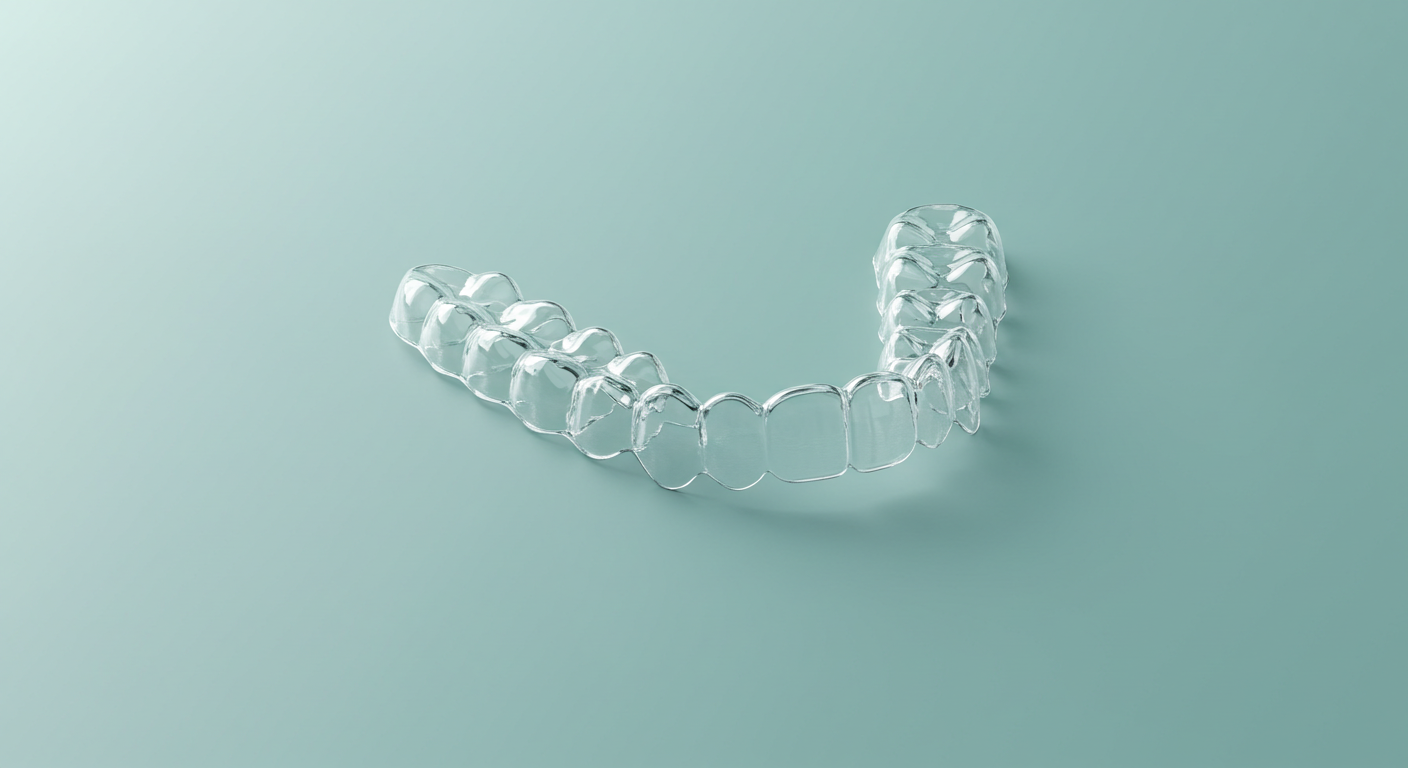Contents

Why Wear a Night Guard? Your 2025 Guide to Bruxism and Teeth Grinding
Bruxism, the medical term for teeth grinding and clenching, affects millions of people, often without their knowledge. Many only become aware of it when a partner hears them grinding at night or a dentist points out the tell-tale signs of wear. In this guide, we'll explore why wearing a custom dental tray—commonly known as a night guard—is the primary defense against the damaging effects of this common condition.
Understanding the Role of a Dental Night Guard
A dental night guard, also known as an occlusal splint, is a removable appliance custom-made by a dentist to fit perfectly over your upper or lower teeth. While it looks similar to a clear aligner, its purpose is entirely different: it's designed to be protective, not to move teeth.
Its primary role is to treat bruxism, a condition characterized by the often unconscious grinding or clenching of teeth, which predominantly occurs during sleep.
The Primary Reason to Wear a Night Guard: Bruxism
At night, we lose conscious control over our jaw muscles. For individuals with bruxism, this is when the most intense and damaging grinding occurs. A night guard is essential because it acts as a protective barrier, absorbing the immense forces generated by clenching and grinding, which can otherwise lead to:
- Severe tooth wear, cracks, and fractures.
- Jaw pain, muscle soreness, and frequent headaches.
- Damage to the temporomandibular joints (TMJ), leading to TMJ disorders.
- Disrupted sleep for both the individual and their partner.
While daytime clenching can often be managed with awareness and stress-reduction techniques, a night guard is the frontline defense against the significant damage that happens during sleep.
Why Custom-Fit is Non-Negotiable
Over-the-counter "boil-and-bite" mouthguards are not a substitute for a custom night guard. They are often ill-fitting, bulky, and can sometimes worsen jaw problems by encouraging more chewing or improper jaw positioning.
Beyond Bruxism: Other Uses for Dental Trays
While bruxism is the main reason for nighttime wear, custom trays have other important applications:
- Orthodontic Retainers: After braces or clear aligner treatment, retainers (which are a type of tray) are worn at night to prevent teeth from shifting back to their original positions.
- Teeth Whitening: Professional take-home teeth whitening kits use custom trays to hold bleaching gel securely against the teeth.
Maximizing the Effectiveness of Your Night Guard
To get the most benefit from your night guard, follow these best practices:
- Consistency is Key: Wear your night guard every single night without fail.
- Proper Maintenance: Clean it every morning with a soft toothbrush and cool water or a gentle, non-abrasive cleaner. Store it in its ventilated case to allow it to dry and prevent bacteria growth.
- Regular Check-ups: Bring your night guard to your regular dental check-ups so your dentist can inspect it for wear and tear and ensure it still fits correctly. A night guard may need to be replaced every few years.
When to See a Dentist About Teeth Grinding
You should consult your dentist if you experience any of the classic symptoms of bruxism:
- Waking up with a sore or tired jaw.
- Frequent tension headaches or earaches, especially in the morning.
- Noticing that your teeth look shorter, flatter, or chipped.
- A partner or family member hearing you grind your teeth at night.
Conclusion: Protect Your Smile While You Sleep
Wearing a custom-fitted dental night guard is a simple, effective, and non-invasive way to treat bruxism, protect your teeth from damage, and improve your quality of sleep. If you suspect you are grinding or clenching your teeth, schedule a consultation with your dentist for a proper diagnosis. A night guard is a crucial investment in preserving your smile and overall well-being for years to come.
FAQ: Your Top Questions About Night Guards and Bruxism
A custom-made night guard from your dentist is designed for a snug, comfortable fit. While there may be a short adjustment period for the first few nights, most people adapt quickly and find they can sleep comfortably. Over-the-counter guards are often bulky and uncomfortable, making them difficult to tolerate.
The cost of a custom night guard from a dentist typically ranges from $300 to $800, depending on the material and your location. While more expensive than store-bought options, it is often considered a medically necessary appliance and may be partially covered by dental insurance.
Bruxism can sometimes be temporary and related to a specific period of high stress. However, for many people, it is a chronic condition. While managing stress or treating underlying issues like sleep apnea can reduce its severity, a night guard remains the most reliable way to prevent the physical damage to your teeth.
You should clean your night guard every morning after use. Gently brush it with a soft toothbrush and cool water. You can use a mild, non-abrasive soap or a specialized retainer cleaning solution. Avoid hot water, which can warp the plastic, and harsh toothpaste, which can be abrasive.
